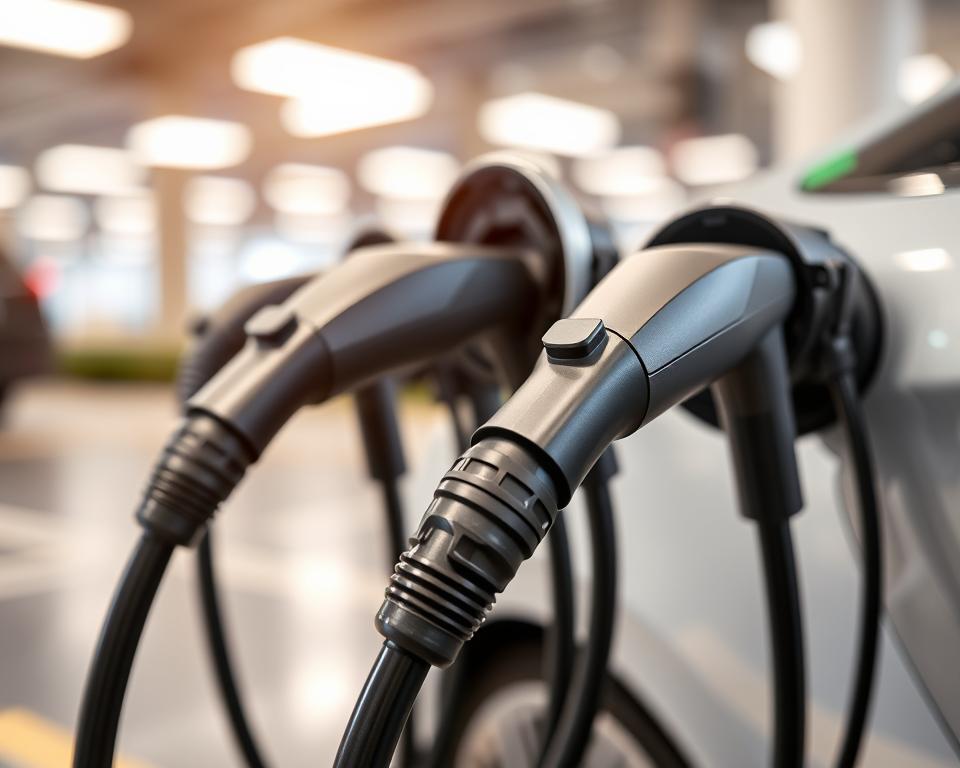Top EV Charging Cable Manufacturers for Your EV
The electric vehicle industry is on the rise, with the demand for dependable and fast charging solutions surging. Currently, industry leaders have been at the forefront of this change, providing premium charging infrastructure. Southwire, for instance, entered the market in 2014 and excels, boasting over 1000 five-star reviews and a 75-year legacy in electrical construction.
The surge in electric vehicle adoption creates a requirement for long-lasting, fast, and safe EV Charger Manufacturers. Top manufacturers are innovating to meet these evolving needs, offering solutions that boost the overall charging experience.
Understanding the distinctions between various charging solutions is crucial for choosing correctly. Quality charging infrastructure directly impacts vehicle performance and user experience.
Essential Insights
- Leading brands provide premium cables that boost durability and security.
- EV market expansion drives need for high-efficiency chargers.
- Industry leaders develop cutting-edge products for EV drivers.
- Premium cables enhance both charge rate and vehicle function.
- Investing in quality charging infrastructure is beneficial in the long run.

Why High-Quality EV Cables Matter
With EVs on the rise, the importance of high-quality EV charging cables is immense. The performance, safety, and dependability of electric vehicle charging systems hinge upon the quality of the charging cables used.
How EV Charging Tech Has Advanced
Electric vehicle charging technology has undergone significant advancements in recent years, with a priority on speedy charge times and enhanced protections. Modern EV charging cables are built for these requirements, incorporating superior materials and construction techniques to minimize energy waste and maximize charging efficiency.
Quality’s Impact on EV Charging
Premium cables enhance both safety and functionality in EV systems. Robustness, such as all-weather performance and flexibility in extreme temperatures, ensure reliable operation across various environments. Moreover, regulatory compliance and following protocols are essential in guaranteeing safe operation.
| Key Features | Benefits |
|---|---|
| Superior materials and construction | Minimized power loss during energy transfer |
| Robust durability | All-weather reliability |
| Regulatory compliance | Certified safety |
| Serviceability | Repairable design for longevity |
Our high-performance cable solutions, such as those offered by Aichie Tech Electronics, are tested for quality and compliance in The Cable Lab. With repairable Portable EV Charger, owners save money long-term through repairs, reducing waste and protecting the planet.
Premier Chinese EV Cable Suppliers
A surge of cable makers in China supports the EV boom. They play a key role in global EV infrastructure, offering premium charging cables designed for different applications.
Wottz: Industry Leaders Since 2014
Wottz has established itself as a prominent player in the EV charging cable market since 2014. They offer a range of cables that cover Mode 1–4 charging standards, including Mode 1, 2, 3, and fast-charging Mode 4 DC Charging.
Aichie Tech Electronics – 75 Years in Electrical Solutions
Aichie Tech Electronics’ seven-decade legacy informs its premium cable designs. Their products are designed to meet the demands of both domestic and commercial EV charging infrastructure.
Additional Key Cable Suppliers
Companies developing flexible, weather-resistant and high-performance cables are also notable. These include specialists in Type 1 (J1772) and Type 2 (Mennekes) connectors, as well as brands innovating in cable durability and adaptability.
A Guide to EV Cable Types
As electric vehicles become increasingly popular, understanding the various types of EV Charging Cable Manufacturers is crucial for optimal charging experiences. Different cables suit different charging needs. The diversity in EV charging infrastructure necessitates a closer look at the cable options.
Type 1 vs Type 2 Explained
Type1 and Type2 charging cables are two common standards used for EV charging. Type 1, also known as SAE J1772, is predominantly used in North America, while Type 2, or Mennekes, is the European norm. The right cable matches your car and charger. Type 2 cables often support higher charging capacities, making them suitable for faster charging.
Level 2 & Fast DC Cables
Level2 charging cables offer faster charging than Level1, using 240V AC power to deliver up to 19.2 kW of power. DC Fast Charging cables, on the other hand, enable quick top-ups by on-site AC→DC conversion, delivering rapid fill-ups. These cables are essential for long-distance EV travel, enabling drivers to recharge quickly.
Portable vs Fixed Cables
Portable EV charging cables, such as “Granny chargers,” offer flexibility by allowing owners to charge their vehicles from standard household outlets. Tethered cables are attached permanently, providing a convenient but less flexible charging solution. The choice comes down to flexibility vs convenience.
Cable length, power rating, and connector type matter most. For instance, portable charging cables range from basic Level1 emergency chargers to more robust Level2 solutions. Vehicle-to-load (V2L) cables let EVs act as mobile power banks.
- Flexible granny chargers and L2 units suit various needs.
- Tethered cables are permanently attached to charging stations, limiting flexibility but eliminating the need for personal cables.
- Lengths vary from 5 m to 50 m—choose wisely.
Key Features of High-Quality EV Charging Cables
High-quality EV charging cables are distinguished by several key features that ensure reliable and safe charging. These features are vital to safe, efficient charging.
Durability and Weather Resistance
Cables must withstand rain, sun, and cold. Manufacturers like Wottz and Southwire use RoHS-compliant recyclable compounds, ensuring they withstand various environmental conditions. Their repairable builds support longevity and eco-reuse.
User-Friendly Design
Cables need to flex yet remain tough. High-quality EV charging cables are built for easy handling without sacrificing strength. This flexibility does not compromise their durability, as they are built to withstand regular use.
Regulatory Approvals
Approved safety marks ensure reliable performance. They ensure their products meet or exceed standards such as IEC62196 for connectors and UL2594 in North America. Rigorous third-party testing evaluates electrical safety, mechanical durability, and environmental resistance.
| Certification | Description | Region |
|---|---|---|
| IEC62196 | Connector safety standards | International |
| UL2594 | Standard for electric vehicle supply equipment | North America |
| ROHS | Restriction of hazardous substances | International |
By focusing on these key features, manufacturers can provide EV charging cables that not only meet the highest quality and safety standards but also enhance the overall user experience.
Innovative Technologies from Leading EV Charging Cable Manufacturers
The latest developments in EV charging cable technology are revolutionizing the way we charge our vehicles, with a focus on speed, improved signal integrity, and sustainable compounds.
Liquid-Cooled Charging Cables for Ultra-Fast Charging
Liquid-cooled charging cables are emerging as a key technology for ultra-fast charging, minimizing thermal throttling during high-power sessions.
Advanced Connector Tech
Hyperboloid contact points improve electrical connection, ensuring stable communication and power flow.
Sustainable and Recyclable Materials
Companies focus on green materials, minimizing ecological footprint with RoHS-compliant, serviceable builds. For instance, companies like Aichie Tech Electronics and Wottz are adopting serviceable design philosophies and RoHS compliance to minimize waste and promote recycling.
Programs for cable recycling, non-toxic compounds, and TPU sheaths mark the eco shift.
Buyer’s Guide to EV Charging Cables
Choosing the right EV charging cable is crucial for efficient and safe charging. To make an informed decision, consider several key factors.
Matching Cable to Vehicle
Verify your car’s inlet and cable plug match. Your vehicle’s onboard charger capacity determines the maximum AC charging rate it can accept.
Picking the Right Cable Length
Select a cord length based on parking and outlet location. A longer cable provides more flexibility but may be heavier and less manageable.
Matching Power and Speed
Match your cable’s power handling to your vehicle’s capabilities. Standard Level 2 home charging operates at 7.2 kW, but some vehicles support up to 19.2 kW with appropriate electrical service.
Mind these points to pick a cable that fits your EV lifestyle.
Why Choose Premium Charging Solutions
With EV growth unabated, premium cables are essential. Investing in premium EV charging cables from established manufacturers like Wottz and Aichie Tech Electronics ensures superior durability and lower lifetime costs. Their serviceable designs allow for component replacement, reducing waste and costs. This approach aligns with the core values of electric vehicle ownership by promoting sustainability.
Selecting top-grade infrastructure prepares you for next-gen charging.


